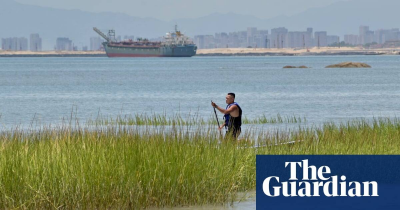The Guardian-China coast guard boards Taiwan tourist boat in escalation of tensions
February 20, 2024 3 min 619 words
中国海警登上台湾游船,加剧两岸紧张局势。此前,一艘中国渔船在台湾海警追捕中翻覆,造成两人死亡。这次事件发生在中国大陆和台湾金门岛之间的海域,令人担忧。台湾方面表示,游船稍微偏离航线是为了避开该地区的浅滩。然而,中国方面却进行登船检查,引发台湾民众恐慌。台湾呼吁中国保持理性和和平,同时强调游船行为合法。在这一紧张时刻,台湾防务部长表示军方将保持冷静,不主动干预,以免进一步升级紧张局势。此次事件发生在先前渔船翻覆事故后,中台紧张关系升级。北京方面声称台湾是中国的一部分,强调两岸渔民在厦门和金海水域有传统捕鱼权。在习近平领导下,中国加强对台坚决实现“统一”的决心。评论认为,这是两岸关系日益复杂的一部分,需要通过对话和冷静处理来缓解紧张局势。
China’s coast guard has boarded a Taiwanese tourist vessel, as tensions continue to escalate in the waters between China’s mainland and Taiwan’s Kinmen islands after a capsizing killed two people last week.
The Taiwanese sight-seeing ferry King Xia was carrying 11 crew and 23 passengers on a tour around Kinmen’s main island on Monday when it was intercepted by two Chinese coast guard patrol vessels. Six officers boarded the King Xia and asked to inspect the documentation of the crew, before disembarking about 30 minutes later, Taiwan’s Coast Guard Authority (CGA) said. Soon after a Taiwan coast guard patrol arrived to escort King Xia back to port.
Kinmen is Taiwanese territory but sits just a few kilometres from the Chinese mainland. Statements from the CGA and Taiwanese officials suggest the King Xia had strayed slightly off course – which the CGA said was to avoid shoals in the area. It said Chinese and Taiwanese tourist vessels often accidentally cross into the other side’s waters but the CGA doesn’t try to board Chinese boats because it is clearly accidental, and called on Chinese authorities to “uphold peace and rationality”.
Kuan Bi-ling, head of Taiwan’s Ocean Affairs Council told reporters on Tuesday the actions of the Chinese coast guard had “triggered panic” among Taiwanese people.
“Boats like these are not illegal at all,” she said.
Taiwan’s Maritime and Port Bureau urged Taiwanese vessels to refuse future requests by Chinese coast guards to board for inspection, and instead to immediately notify the CGA.
Taiwan’s defense minister, Chiu Kuo-cheng said on Tuesday the military would not “actively intervene” in the incident, so as to not further escalate tensions.
“Let’s handle the matter peacefully,” he told reporters.
One passenger on the tourist boat told Taiwan’s United Daily News the incident was “very scary” and she was “worried that they might not be able to go back to Taiwan”.
The incident comes amid heightened tensions after a Chinese fishing boat, which was being pursued by Taiwan’s coast guard, capsized on Wednesday. Two of the four people on board died, and the other two were detained by the coast guard.
At the time, Beijing condemned the actions of Taiwan’s coast guard and called for further investigation of the deaths. It also announced it would increase inspection patrols in the area. Taiwan’s government defended the incident, saying the Chinese crew had illegally entered Taiwanese waters, “refused to cooperate” with requests to board for inspection, and sped away. It said the CGA had the right to “enforce the law”.
On Saturday, China’s Taiwan Affairs Office called for Taiwan to release the two detained fishers, and rejected Taiwan’s claim the boat had been in “restricted waters”.
The office’s spokesperson, Zhu Fenglian, said that both sides of the Taiwan Strait belong to China – a reflection of Beijing’s claim that Taiwan is a province and not a sovereign state.
“Fishermen on both sides of the Taiwan Strait have been operating in traditional fishing grounds in Xiamen and Jinhai waters since ancient times. There is no such thing as ‘prohibited or restricted waters’,” Zhu said.
On Monday the office said family members of the four fishers in the capsize would travel to Kinmen, accompanied by Chinese representatives for support.
Beijing has long claimed Taiwan, and under the rule of Xi Jinping it has strengthened its resolve to achieve what it terms “reunification”. Xi has not ruled out using force to do so, but in an effort to avoid war has instead increased military harassment, economic coercion and incentives, and cognitive warfare.
Additional research by Chi Hui Lin

